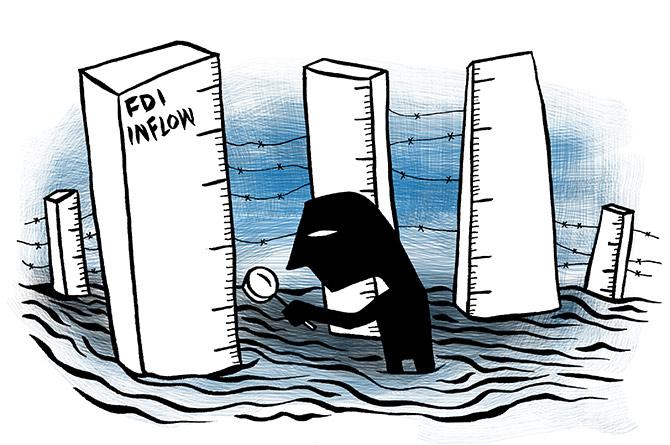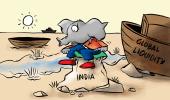Hardening interest rates globally and worsening geo-political situation have impacted the foreign direct investment (FDI) inflows into India in 2022-23, a top government official said on Tuesday.

Secretary of the Department for Promotion of Industry and Internal Trade (DPIIT) Rajesh Kumar Singh said that the department would analyse the reasons for the contraction in FDI in five important sectors like computer hardware and software; construction, education, automobiles and metallurgical industries.
"I cannot think of any other reason. It is not as if our FDI policies have become protectionist.
"On the contrary, we have kept it very very liberal ... The decline is combination of hardening of interest rates along with geo-political risks going up around the world. In general the appetite may be less," Singh told PTI in an interview.
These five sectors had a share of $30 billion in India's total FDI in 2021-22 and in the last fiscal year, overseas inflows have almost halved.
"Why exactly in those sectors (FDI) has come down is to be analysed. We will have to analyse," he added.
FDI equity inflows into India declined by 22 per cent to $46 billion in 2022-23.
The investments during the January-March 2023 quarter plunged by 40.55 per cent to $9.28 billion.
Though the computer software and hardware sector attracted the highest inflows of $9.4 billion during the last financial year, these inflows are down as compared to $14.5 billion in 2021-22.
Similarly, FDI in the automobile industry dipped significantly to $1.9 billion in 2022-23 as compared to about $7 billion in 2021-22.
However, the secretary added that the government is doing investment promotion on a large scale and the inflows would start recovering.
The secretary added that sectors which have received healthy inflows include information and broadcasting, agri machinery, railway-related components, medical appliances, defence industries and scientific instruments.
There has been an increase in central bank rates across the globe.
US Fed has increased the rate from 0.25 per cent to 4.75 per cent in the last year, due to which the US has become an attractive investment option.
Similarly, Bank of England raised the bank rate to 4.5 per cent in May this year from 0.25 per cent on January 2022.
The three month compunded Singapore overnight rate average (SORA) has increased to 3.6 per cent in March this year from 2.5 per cent in October 2022.
The real GDP growth rates of Singapore, the US and the UK have decreased in 2022, which are the major source countries for FDI.
These countries together account for over 50 per cent of FDI inflows in 2022-23.
When asked about the impact of a recent notification giving an angel tax exemption to funds coming from only 21 countries, Singh said: "This would lead to an influx of funds in the GIFT city. That avenue is available".
"We want them to come from better-regulated parts of the world and we are giving good facilities at GIFT city for people to take advantage of that ... A lot of this will start coming from IFSC (International Financial Services Centre)," he added.
The finance ministry has notified 21 countries, including the US, UK and France, from where non-resident investment in unlisted Indian startups will not attract angel tax.
The list, however, excludes investment from countries like Singapore, Netherlands and Mauritius.
Replying to a question about the revival of private investments in India, he said as per his interactions with industry associations, things are looking up, capacity utilisation has improved and the industry is looking at additional investments.











 © 2025
© 2025